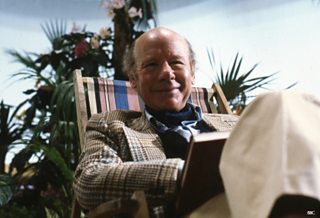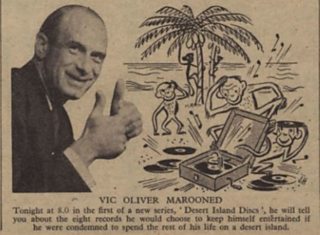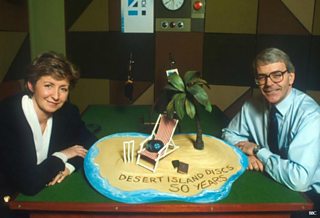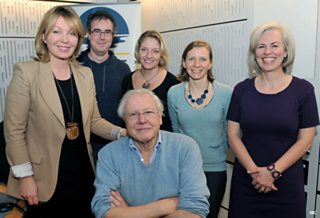The Sunday Post: 75 Years of Desert Island Discs
Andrew Martin
�������� Genome

Living on an Island - Roy Plomley, creator of Desert Island Discs, and its presenter from 1942 to 1985, pictured on the imaginary island in the 1982 Arena documentary about the show
Among the many long running series which �������� Radio 4 is home to, one of the longest running is , which celebrates its 75th birthday today. Created by in 1941 as a new way of combining interviews with music, it has now clocked up over 3,000 editions. It remains as popular as ever, often creating headlines with high profile ‘castaways’ such as the guest for the current anniversary, footballer David Beckham.
The format of the show imagines that the castaway finds his or herself on a desert island with only eight records for company. This was later added to by allowing a luxury item, which must be of no practical use (or a living thing), and a book, though the Bible – or equivalent – and the Complete Works of Shakespeare are automatically provided. The castaway discusses his or her life, and how the musical tracks chosen relate to it. At the end, they decide which of the eight songs they would take if only one was allowed.
Over 75 years the programme has included a huge cross section of the great and the good from all shades of celebrity, from actors, comedians and musicians, to scientists, religious and political figures, and those who come under the heading of miscellaneous.
Particularly notable figures are often invited for milestones in the programme’s history, such as for the 500th show (though it turned out, when it was re-checked, to only be the 498th). was the castaway for the 1000th edition, and appeared for the 40th anniversary of the show in 1982. Several holders of the office of have appeared, and even .
Some castaways have been chosen twice, and some three or even four times (for example and ). Occasionally two people share an edition, such as , or the . Looking back over the years, some of the names are now obscure, but the fact that they appeared on the show, especially once it had become a broadcasting institution, shows that they were an eminent person at the time.

Is Vic There? Radio Times publicises the first edition of Desert Island Discs, where the castaway was Winston Churchill's son-in-law
Roy Plomley was born in 1914. Before the war he was an actor, and an announcer on commercial broadcasts from Europe, but after the fall of France in 1940 he joined the ��������. , head of the �������� Gramophone Department, asked him to come up with an idea for a new programme. Plomley admitted in his eponymous 1975 book about the show that choosing a list of books or music to take to a desert island was a popular parlour game, but he was the first to create a radio format around it.
Like almost all broadcasting in that era (especially during the war, due to the need for censorship), the early programmes were fully scripted. The first ever edition, with comedian , only exists as a transcript, but it is like a comedy routine, with Plomley as the straight man. After the war, with security no longer an issue, and as people became less afraid of someone saying something untoward, scripting was phased out.
Technology also helped: the early programmes were recorded onto acetate discs, the standard medium at the time. These were fragile and could not withstand repeated playing, which is why none of the earliest editions survive. By the 1950s audio tape had replaced discs, which was easy to edit, so there wasn’t the same need to take care what was said.
Despite this, the programme was unrehearsed, and unless there was a problem with a particular thing the castaway said, it was usually pre-recorded in one take. The comic writer thought his show’s recording was just a rehearsal, and asked to do it again when he realised his mistake. However the result was less satisfactory the second time, because the relaxed atmosphere was missing.
Plomley stresses in his book that the selection of tracks would not simply be the subject’s favourite music, but those pieces which could stand repeated playing if they were really stranded on an island. During his time as presenter, Plomley was strict about adhering to his own rules, although he did once allow the luxury to be animate (a cat, asked for by ).
Some castaways were vague about the music they wanted. One confessed to being tone deaf, and needed much coaxing to make his selections. Anyone who needed it was given as much help as possible, though Plomley was careful to try never to influence them. However he was not a fan of pop, and in his book rarely mentions the name of any piece of music other than classical pieces.

So Lonely - Sue Lawley interviews Prime Minister John Major for Desert Island Discs' half century, whose music choices appropriately included Gershwin's Rhapsody in Blue
The selections made could be eclectic or highly limited. There was a tendency with certain musicians to choose a majority of tracks on which they themselves featured, one celebrated example being the soprano who chose nothing but her own records (including a single orchestral piece, which, according to Plomley, dated from her early career as a viola player).
Some zealous listeners noticed that the sound effect of seabirds played over the title theme (, by the prolific Eric Coates) was of herring gulls, unlikely to be heard on a tropical isle. More authentic bird cries were experimented with in the early 60s, but never sounded right, so the gulls returned. Other correspondents pointed out that the title should be ‘Deserted Island Discs’ rather than ‘Desert’, but Plomley responded that it was a bit late to change.
Plomley’s approach to the interview, beginning with lunch to get to know the subject, reflected his clubbable and avuncular personality. For most of his time on the show, the interview was recorded separately, and the records edited in later. Recording was normally in a �������� studio, though occasional exceptions were made for reasons of eminence or infirmity. Some accused the programme of being too cosy, but it was intended to gently get under the skin of the castaway, rather than be psychologically challenging, like .
Not every programme went smoothly. One contributor, film director , appeared to take issue with some of Plomley’s remarks, although Plomley insisted afterwards it was all a joke, and Preminger had a twinkle in his eye. The programme once secured an interview with Alastair MacLean, but it turned out they had booked someone else with the same name, not the . The recording went ahead anyway, but was not transmitted.
A 1961 programme with the author and critic was also dropped, although scheduled, because she died suddenly between recording it and the projected transmission date. However the 1980 interview with was broadcast despite his having died before the programme was aired.

Wild Thing - David Attenborough's fourth appearance as castaway was in 2012. Sir David is seen here with presenter Kirsty Young and the production team
There was one major break in the run of Desert Island Discs, in 1946, when Plomley decided he wanted to do other things. An edition with the actress was intended to be the last programme, however after five years it was decided to bring it back. On 3 January 1951, actor was the first castaway on the revived series, which has been going ever since.
Plomley himself was twice the castaway, in the last episode of the first series in , and again in 1958. He was interviewed respectively by Leslie Perowne, and by . In the latter case, the roles were reversed to their normal order.
Roy Plomley guided the show through nearly 1,800 episodes, until his death at the age of 71 in 1985, with his last castaway the actress . The programme was so identified with him that there was doubt whether it could continue, but the �������� was keen for it to go on, and vitally Plomley’s widow Diana, who now owned the format, agreed.
After much discussion on possible hosts, was appointed, and his was broadcast in January 1986. However after two years he left, to be by , who saw the show through the next 18 years. was appointed as the fourth and current host of Desert Island Discs in 2006.
Throughout these many years, while some have detected subtle changes in the format (overall, less classical music is chosen now than in former times) the show is essentially the same one that Roy Plomley devised during the war. It has survived the vicissitudes of broadcasting fads and fashions, and the advent of dozens of programmes which have adopted variations on the same basic idea (sufficiently different to avoid copyright problems).
Desert Island Discs is a simple format, but one that is self-evidently successful, as it has survived largely unchanged for three-quarters of a century. It would surprise no-one if it lasted the other quarter, as one of the great and enduring classic radio programmes.
